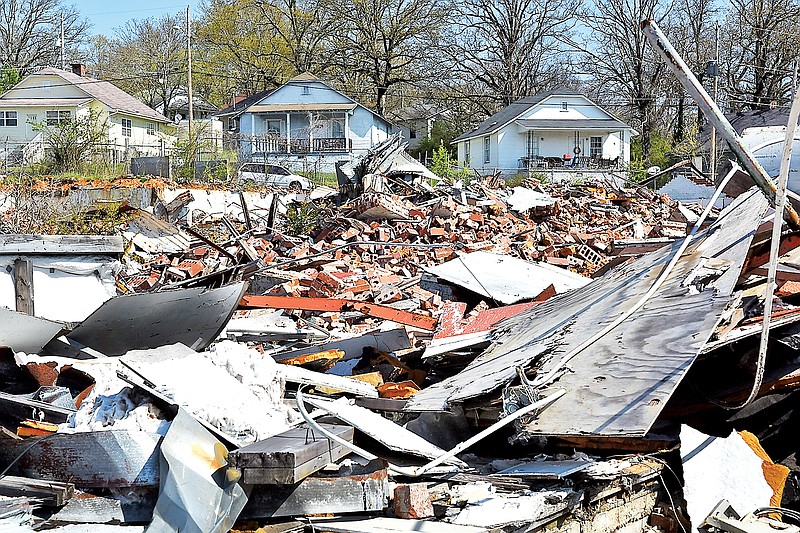History of Lupton City:
In 1920, John T. Lupton acquired 1,000 acres of land near the Tennessee River and created the mill town of Lupton City for his Dixie Mercerizing Co. The Dixie Co. changed its name to Dixie Yarns in 1964 and later to the Dixie Group. The mill used the mercerizing process to make yarn and fabric stronger and easier to dye by altering the chemical structure. Dixie Yarns sold the mill to R.L. Stowe Mills in 1998, and it began producing thread. The plant closed in 2009 and was sold to Lupton City LLC in 2012. Lupton City LLC is connected to the Dockery Group, which is based out of Peachtree City, Ga.Source: Times Free Press archives
Chattanooga has issued citations. Fines have been handed down. And people have complained.
But the rubble and debris left from the old Dixie Yarns mill in the heart of the Lupton City neighborhood still remains.
Residents of Lupton City say they are fed up with the lack of action taken by the city and the current owners of the property to clean up the heaps of brick, piles of scrap metal and half-demolished buildings that have marked the nearly 12-acre lot for years.
Sarah Candler lives on a street that borders the old mill property, and said she is frustrated that the eyesore has been allowed to remain outside her house for so long. She wants action to be taken to redevelop the land, which used to be the centerpiece of the community.
The Dixie Yarns mill was built in 1920 by businessman John T. Lupton, who built a classic "company town" around it. The mill changed hands over the years and finally closed in 2009. In 2012, the property was sold for $220,000 to Lupton City LLC, which is connected to the Dockery Group of Peachtree City, Ga. The new owners started demolishing the mill and salvaging its parts for profit. But once they got everything they wanted from the site the demolition abruptly stopped nearly a year ago, residents say.
In City Court on Thursday, Judge Sherry Paty agreed to fine the company that owns the property more than $11,000 for 185 days of litter violations, beginning in November of last year, and a variety of court costs.
Nathan Dockery, current owner of the Lupton City LLC and the Dockery Group, a construction company based in Peachtree City, Ga., did not show up in court or return requests for comment. He is not personally being fined by the court's most recent order -- his LLC is -- which means he can claim bankruptcy and walk away from the property without severe financial repercussions or penalties.
Chattanooga Councilman Jerry Mitchell previously told the Times Free Press that the property taxes on the land have gone unpaid for two years and now total more than $100,000. If a portion of the taxes is not paid by 2016, the property will be turned over to the city unless alternative action is taken.
City Attorney Wade Hinton said he and the city are actively working to find a solution to the problem that exists with the property.
He said Thursday's court proceedings were an example of the city taking action to prosecute the owners.
"What we were focused on [in court] was trying to move forward with the case," Hinton said. "The city is beyond bothered and angered by the condition of the property and certainly understands the frustration of residents."
Mayor Andy Berke attended a community meeting in the neighborhood last week and heard residents' concerns, but Candler said she remains disappointed in the lack of action being taken to clean up the mess.
"It's nice to see that people are at least becoming aware of the big mess in Lupton City," Candler said. "It's just a shame that that land is not being put to better use."
Several environmental studies have been done on the property, and Byron Barton, who was a part of a Phase II Environmental Site Assessment that took place there last April, said the land has a lot of redevelopment potential.
Barton is a senior biologist at GeoServices, the company that conducted the study, and he said the environment is not being further damaged by the lack of action based on what the study found. But he was quick to acknowledge that the lack of action is not benefiting anyone or the environment.
"You can redevelop on a site like this," he said. "... We are developing sites all the time that have environmental impacts, and if you isolate those impacts you will better that situation for the community."
Contact staff writer Kendi Anderson at kendi.anderson@times freepress.com or 423-757-6592.
